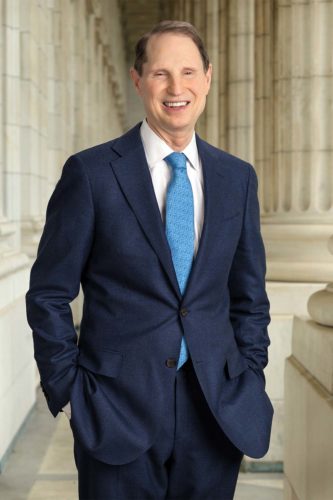
A lonesome bagged rotisserie chicken sits under a heat lamp in the north Eugene Fred Meyer. Sen. Ron Wyden, who had traveled from a Memorial Day event in Medford, exclaims that he’s happy to have grabbed the store’s last roast chicken on a spit.
Since his election to the U.S. Senate in 1996, Wyden says he’s been driven to hold meetings throughout the state and surpassed 1,000 town hall meetings by late 2021. But Fred Meyer, he tells Eugene Weekly, is where he can meet people and grab a rotisserie chicken, a dinner favorite.
So EW and Wyden shared a lighthearted chicken and also talked about weighty national issues, including gun control, student loan forgiveness and abortion protections — as well as the role Fred Meyer stores have played in Wyden’s career.
After the Uvalde, Texas, school shooting, where 19 children and two teachers were murdered and 17 others wounded, Wyden says he’s heard from young people in Oregon who have grown up with gun violence and feeling fed up with active shooter drills.
“There should be a right to a childhood,” Wyden says.
Gun reform in Congress, Wyden says, is different this time compared to previous school shootings. “We’re going to have these next few weeks,” he says, adding that senators are ideally at home meeting with constituents.
Although President Joe Biden told Ulvade mourners May 30 that there would be gun control reform coming, he has also said that it’s Congress’ job. Wyden says there are a number of reform bills that Congress is working on.
“We’ve now got a group of Democrats and Republicans working to come up with something bipartisan,” he says.
One is a background bill, HR 8, which narrowly passed the House of Representatives in 2021, but it hasn’t been introduced in the Senate, likely due to the Democrats’ lacking the necessary support to avoid a filibuster. The bill would prohibit a transfer of firearms between private parties unless a licensed gun dealer, manufacturer or importer has possession of the firearm and conducts a background check, according to a summary of the bill.
Wyden says he and Sen. Richard Blumenthal introduced a bill that would close a loophole that allows those who have been found guilty of domestic abuse to obtain firearms. It would end situations ”where domestic violence abusers can keep their gun even when they have restraining orders” against them, he says. If the bill passes, he says he thinks it “could lead to other pieces of gun violence legislation like background checks.”
As chair of the Senate Finance Committee, Wyden says he’ll likely use the power of the committee to investigate whether firearm companies and banking institutions that help buyers finance purchases are following the tax law.
With 44 million Americans dealing with student loans, the Biden administration is reportedly considering an executive order that would forgive $10,000 of federal student loan debt held.
“There’s also going to be an effort to dramatically expand public service opportunities that can drive down the debt,” Wyden says. “I’m interested in that.”
And with the pending U.S. Supreme Court ruling that could overturn Roe v. Wade, Wyden says he’s going to work toward protecting women’s data. According to a May 17 letter signed by Wyden and other senators, he criticized companies that use cellphone location data to target anti abortion ads to women who visit abortion clinics.
After covering some of the nation’s biggest problems, Wyden sat in the plastic chairs and the tan-walled dining area at Fred Meyer and reflected on the place that stores have had in his career. Among them is meeting the namesake owner in the 1970s when Wyden was the director for the Oregon chapter of the Gray Panthers, a senior citizens-oriented group modeled after the social justice-oriented Black Panthers. Speaking with Meyer about why Meyer should pay a reduced rate for bus fare, Wyden recalls walking him through the economics of it.
“Finally I had to say, ‘Mr. Meyer, if you felt like it, you could probably just buy the bus company,’” he laughs.
Visiting Fred Meyer stores became a tradition as he spent more time on the road traveling to and from those 1,000 or so town hall meetings. And he’s found it to be a way to keep up appearances with constituents.
“It’s always really convenient to say hello to a lot of people,” Wyden says. “And if you have a little extra time, you buy your toothpaste and socks.”
This article has been updated.